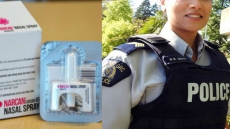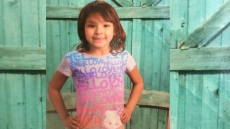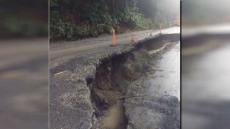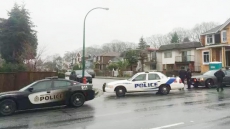MONTREAL — When he was driven deep into the Libyan desert and told to kneel in the sand, Frank Poccia thought his seven weeks as a hostage were drawing to a tragic close.
Lying on the ground, surrounded by armed gunmen, he thought, "OK, this is where they're going to kill us, something didn't go right," Poccia recalled.
Instead, the 52-year-old Canadian and two fellow Italian hostages were loaded into another vehicle and taken to the airport where they were released, 47 days after being taken captive by armed gunmen as they headed to work in Ghat, Libya.
Now, a month after the Italian government announced the men's release, Poccia told The Canadian Press he considers himself lucky to have escaped the ordeal and happy to be back home with his family in Montreal.
"It's been a relief," he said. "I went through some tough times, but I think my family went through some extremely tough times, and they still are. Things haven't gotten back to normal just yet."
Poccia, an Italian-born Canadian, had been in Libya working on a project at the Ghat airport that was contracted to his employer, a Montreal-area aerospace company.
On the morning of Sept 19, he was driving to work behind the Italians when both vehicles were intercepted by a group of masked and armed men.
After being bound and blindfolded, the three were driven deep into the desert, where they would spend the following weeks confined in a series of small rooms.
After the fear of death subsided, he said the hardest part of his captivity was not being able to contact his family in Canada.
"After the first day you surmount that fear and just live on adrenalin," he said. "My biggest concern was what was happening to my family while I was here."
Poccia said the hostages were fairly well treated by their captors, who gave them enough food and water and only blindfolded them when they left the room.
But he said he knew his family didn't know that, and worried about how it must be affecting them.
"You spend a lot of the day trying to think of other things but you always go back to that," he said.
Poccia's wife, Paola Fusco, said the incident was traumatic for her and the couple's two adult children, as they didn't know whether Poccia was alive or dead until just before his release.
Although Poccia has worked in dangerous parts of the world before, Fusco had never really felt he was in any danger.
"He's always careful, does his work, lays low, doesn't go where he's not supposed to," she said.
Poccia says he still doesn't know much about his kidnappers, who he says always wore masks and didn't speak English.
Although some extremist groups are known to operate in the area, he said he didn't believe they were members of a terrorist group.
He believed the fact they smoked, rarely prayed and didn't act violent toward him was more indicative of young gang members.
"They wanted to keep us healthy and ongoing so they could collect their ransom or whatever else they were looking for," he said, while adding he had worried his captors would sell the hostages to ISIS or al-Qaida.
Poccia says he's equally unsure of whether a ransom was paid and exactly what role the Italian and Canadian governments played in securing his release, although he believes Italy took the lead.
He said it was "a shock" to look in the mirror after his release and see his own wildly matted hair.
Among his first requests upon arriving in Italy were a toothbrush and a haircut, the latter kindly provided to him by the wife of a Canadian government official in Rome.
Although he emerged relatively unscathed, he says it will be a while before he and his family will feel ready to travel again, even for a vacation.
He'll work in the Montreal area for now, although he hasn't altogether ruled out going overseas again.
"I haven't made up my mind yet, but for the time being, I'm not going anywhere," he said.





